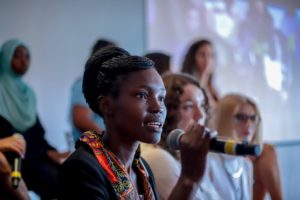Today is International Day of the Girl, and this year’s theme, ‘GirlForce: Unscripted and Unstoppable,’ offers an inspiring reminder to funders to take stock of how our priorities and practices elevate the power of girls to change the world.
Although girls’ lives around the world have improved in many ways, persistent social, cultural, legal, and political barriers stand in the way of ensuring that every girl grows up to reach her full potential.

Belinda, a leader and role model at Nyanza Initiative for Girls Education & Empowerment, speaking at the 2018 Human Rights Funders Network conference. Photo: Lucy Emms, With and For Girls collective.
To overcome these barriers, funders need to support, strengthen, and connect organizations that challenge gender inequality by centering programs on girls, and by creating nurturing spaces where young feminist leadership can flourish.
Here at Global Fund for Children, the community-based groups we partner with have taught us six important lessons for advancing girl-focused work:
1. Pay attention to girls’ leadership
When we fund work that aims to change the lives of girls, it is important to play careful attention to the role they play within organizations. Girls and young women who lead organizations have the potential to serve as inspiring role models and act as movement leaders. There are many models we can look to: Artemisa in Honduras is led by a group of primarily lesbian and bi-sexual young women who reject a traditional single-leader model, while Nyanza Initiative for Girls’ Education and Empowerment in Kenya enables girls to take on leadership roles through participation in NIGEE’s steering committee.
2. Provide flexible funding
Providing flexible funding is especially important for girl-centered and girl-led groups, as it helps them determine their own agendas and make decisions about how best to use the resources. Girls and young women often do not have equal and meaningful participation in decision-making that affects their lives, both in formal spaces like governments and in informal ones like community groups. Flexible funding helps advance gender equality by redistributing power to girls and young women to make choices and pursue their own goals.
3. Walk the talk
Creating a more just and equitable world through the work that we support requires us to challenge our own practices and ways of working, to ensure that we are supporting processes that foster agency. This can mean taking a step back in order to shift decision-making power to young women and local leaders – from inviting them to collectively design their own indicators of success, to making sure they have an equal say in which projects to fund.
4. Make space for connection
Community-based groups that advance the rights of girls often face isolation and personal risk as they work to challenge cultural norms and practices such as child marriage, female genital cutting, freedom of movement, and bodily autonomy. Funders can help to foster solidarity, connection, and mutual learning by bringing their partners together and creating spaces for organizations to gather, share, and learn.
5. Join forces with peers
Many institutions now believe in the value of investing in girls, yet we can all do more to ensure that these investments are significant, visible, and coordinated. Organizations committed to elevating girls have the potential to speak with a louder voice by joining forces with others to share resources and aggregate learning. With and for Girls, for example, is a collective of 11 funders that embraces girl-led grantmaking, giving girls around the world the final say in awarding grants to courageous girl-centered and girl-led groups.
6. Don’t make girls shoulder all the burden
Girls are powerful influencers, but boys must also do the work to transform gender norms. We believe it is critical to support girl-led and girl-centered organizations that understand their girls’ needs, and to create safe and nurturing spaces for girls to develop confidence and skills. Investing in boys as feminist allies can help complement this effort, by helping boys deepen their understanding of masculinity and of the attitudes and behaviors that perpetuate violence.
At a Human Rights Funders Network conference last October, a group of young women leaders from With and for Girls award-winning organizations delivered the closing session of the conference. They challenged the funders in the room to step up our commitment to girls and live out the motto of ‘nothing for us without us.’ As the young Swedish activist, Greta Thunberg, reminds us about climate change, there is much more to do. We think this is similar for the challenge that the young leaders presented. We are proud to accompany dozens of community-based organizations on this journey as they elevate the power of similarly ‘unstoppable’ girls.
Corey Oser is Vice President of Programs at Global Fund for Children



Comments (1)
The argument around girls empowerment is critical at this moment of contemporary world. The gender norms and cultural practices especially in developing countries gives limited opportunities for girls to progress in Education, leadership, employment etc. I agree with Corey and again it's very important for donors and different stakeholders to mainly focus on holistic girls development. The education that support girls to know themselves, understand others and provide ability to identify opportunities around themselves while putting more emphasis on building girls' foundation by providing necessary support to parents and teachers. Many thanks Corey and Global Fund for Children to invest your time and resources in bold ideas that promotes girls empowerment..